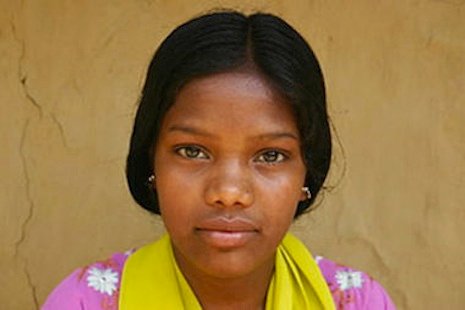The child bride who amazed India when she said “I won’t”
 When Rekha Kalindi was nearing age 12, her parents told her they were planning to marry her off. Rekha’s response would reverberate all the way up to the president of India: “No.”
When Rekha Kalindi was nearing age 12, her parents told her they were planning to marry her off. Rekha’s response would reverberate all the way up to the president of India: “No.”
Nearly half of all Indian females get married before turning the legal minimum age of 18. The requirement has been in place for more than three decades, but centuries of custom don’t change overnight – and that’s especially true in Bararola, a land carved up into small farm plots and crisscrossed by dirt paths that takes at least a day’s journey to reach from Calcutta. But even here, some people are taking a stand.
Many locals eke out a living making beedis, a leaf-wrapped Indian cigarette. Rekha was rolling beedis with her parents inside their mud-hut home when they broached her nuptials.
“I was very angry,” says Rekha. “I told my father very clearly that this is my age of studying in school, and I didn’t want to marry.”
With the help of friends, teachers, and administrators, Rekha accomplished what the law alone has not. No child marriages have taken place in the surrounding villages where she and two other girls refused to marry last summer, and similar approaches are meeting some success in other regions.
“We have a strong law and we need to find the people who can advocate for [it],” says Sunayana Walia, a senior researcher at the Delhi office of the International Center for Research on Women. “All the [successful] interventions are tapping the girls … so they are able to campaign on this issue, along with community participation.”
South Asia has the world’s highest levels of child marriage. A paper published in the Lancet,a British medical journal, in March found that 44.5 percent of Indian women who recently reached 20 to 24 years of age had been married by the time they were 18. Of these, 22.6 percent were wed before age 16 – and 2.6 percent before 13.
Child brides face greater health risks and their babies tend to be sicker, weaker, and less likely to survive childhood, according to UNICEF. The child-welfare agency also cites research fromHarvard University that found that even a one-year postponement of marriage increases these girls’ schooling level by a third of a year, and their literacy by 5 percent to 10 percent.
Rekha learned about the dangers of child marriage firsthand when her older sister got married at age 11. She is now illiterate, and lost all four of her children within one year of birth.
“I had a talk with my sister,” Rekha says. “She said, ‘You have seen me, I’ve lost my children…. It’s good you stood against child marriage.’ ”


 Votes : 0
Votes : 0









